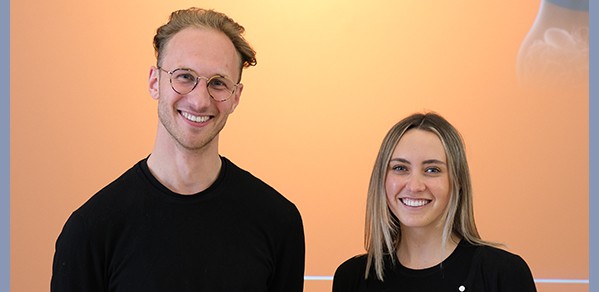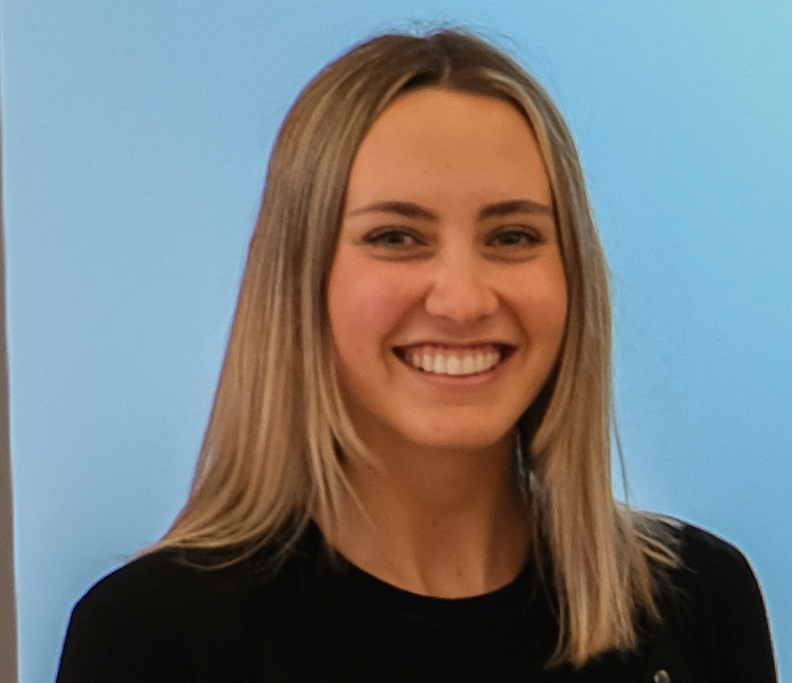
Engineering PhD students Elise Jenkins and Ben Woodington, co-founders of Opto Biosystems – a start-up aiming to develop miniaturised implants for the brain to help treat serious medical conditions – have won the 2022 Wolfson Enterprise Competition after they successfully pitched their concept to a panel of judges, entrepreneurs and venture capitalists.
Bioelectronics is the future of medicine. It presents new opportunities for diagnosis and treatment of serious medical conditions such as brain cancer and epilepsy.
Elise Jenkins, Opto Biosystems co-founder
Elise and Ben, who are conducting PhD research in the Department of Engineering’s Bioelectronics Laboratory, under the supervision of Professor George Malliaras, are looking to revolutionise healthcare by developing miniaturised sensors that can be implanted into the brain to provide an unparalleled stream of data.
“Bioelectronics is the future of medicine,” says Elise. “It presents new opportunities for diagnosis and treatment of serious medical conditions such as brain cancer and epilepsy – complicated conditions where the development of new drugs are not necessarily improving our ability to treat these conditions.”
Elise’s PhD research is focused on electrotherapy for brain tumours. Ben, meanwhile, is using flexible and shape adaptive bioelectronics to sense and stimulate the central nervous system. He takes methods of fabricating devices from the semiconductor industry and applies it to medical devices. The aim is to create small, thin, flexible chips that can be injected into the body via a minimally-invasive procedure. Once these chips connect with the body’s central nervous system, they can monitor and relay information that could be used to help design treatments.
"The brain is incredibly powerful and complex, but things go wrong and we need to understand it better," said Elise.
Together, via Opto Biosystems, Elise and Ben are aiming to deliver a therapeutic device in an outpatient procedure for the first time. The idea being that readings can be taken over an extended period of time, monitoring brain episodes as they happen and tracking brain activity while a person is asleep – with no need for major surgery or an overnight stay in hospital.
The judges of the Wolfson Enterprise Competition were particularly impressed with the way in which they had translated their PhD research into a product with practical applications in the real world.
Ben said: “We both work at the cross-section of technology and healthcare. The tools and devices we research in our lab are not intended to be flipped as an academic paper and forgotten about. We are both passionate about moving these exciting technologies from the lab and into the hands of the doctors who can do real good with them.”
Cancer Tech Accelerator
Outside of the competition, the duo have already successfully pitched their device concept to the Cancer Tech Accelerator – a programme set up to support innovative technologies that can advance the early detection, diagnosis, monitoring or treatment of cancer. Elise and Ben are one of seven teams accepted onto phase two of the programme and they have been awarded £70,000 in funding by Cancer Research UK, Roche and the Medical Research Council, to develop a proof of concept.
 Elise says:
Elise says:
“Bioelectronics is not only a buzz or hype, it is turning 'wacky' concepts into real technologies that can change lives.
“I was inspired by the field of bioelectronics early on in my engineering degree, when I began understanding how control systems could be applied to bionic limbs.
“It’s a field that is revolutionising the way we understand and treat diseases.”
 Ben says:
Ben says:
“Bioelectronic medicine is one of, if not, the most exciting spaces to be working in medicine right now.
“Advances in material technologies, computing power and electronics have developed to the point that we are now at, where treatments that were once thought of as science fiction (and by many non-scientists still are) are becoming real.
“We are going to see an explosion of treatments enabled by this technology in the near future and to be a part of that is incredible.”
Adapted from a Wolfson College news article.

